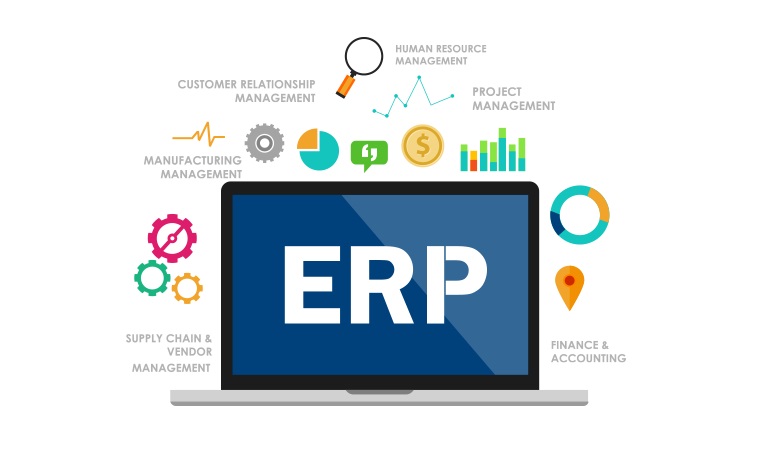How would you say your process management is working well in your business? Do you already use any ERP Software?
While many companies are looking for technological solutions for data processing and operational optimization, business owners who hesitate or feel they do not need to modernize can lose their market space very quickly.
The most commonly used technology to stay competitive in this sense is ERP Software, which seeks to simplify, centralize and monitor the entire corporate operation. See what this acronym stands for and how this system can transform your business!
What is ERP?
ERP stands for Enterprise Resource Planning. The term is generally used for management of software that integrates all data from several sectors into a single centralized system.
The idea of this type of solution is to document, account and allow the manipulation of relevant information, allowing complete control of the operation from a plant.
In this way, the company creates a backbone of your business; a system that connects all functions in a linear, automated environment.
At a retail level, for example, such software can integrate sales order, vendor contact, and stock control information so that a product is never at fault without the business owner having to manually check and calculate each of these data.
The Advantages of Adopting ERP Software
But what is the practical effect of an ERP system? Below, you can know the biggest benefits of the solution for your company.
Centralize data processing
That’s the big thing about enterprise resource planning. It is becoming increasingly difficult to remain competitive without the support of technology to integrate departments because the speed with which the market changes today demands the entrepreneur’s ability to adjust course without making major structural reformulations.
Inventory adaptations, labor reassignment, identification of opportunities for growth, finally; all these attitudes are necessary to stay competitive.
Of course, processes are easier if all company data is on one system. It is not enough to know the pieces well, it is necessary to understand with a wide view where they fit and how they move.
Increase the visibility of critical data
The operating data are the basis of your business decisions, the bricks to continue to expand your business. Now, imagine building a house where each brick has a different size and shape.
ERP systems collect, organize and arrange data from all departments of the organization in a standardized way and enable segmentation according to the perspective they seek in their management.
In one place, you visualize operating costs, profit margins, working capital, and many other critical data. It is in the interaction between them that the entrepreneur finds ways to reduce expenses, increase productivity and maximize earnings at the end of the month.
Connect business activities
Communication between sectors within a venture is critical to avoid rework, delays, waste of resources and swelling of the operation.
ERP module is not just a tool for controlling your management. Through it, it is possible to connect employees, suppliers, and customers in the same way that connects end-to-end business. That is, ERP software can ensure that everyone involved speaks the same language.
Reduce costs and failures
One of the main reasons why companies look for ERP Software as a management solution is the chance to streamline the operation while reducing the cost of time and money for routine tasks.
By automating the collection and control of data, the entrepreneur can eliminate a series of small processes along the entire production chain, which accumulate to erode the resources at the end of the month. In addition, with the centralized system, it is possible to identify in detail where the biggest bottlenecks are for the business to evolve.
Finally, such automation also helps reduce human failures, which often cause considerable losses – sometimes strategic, but most financially damaging.
Modernize the operation
In the end, all of these advantages are part of a greater benefit to your business: the modernization of data control and corporate operation.
Modern companies spend less money, produce fewer processes, and are better able to adjust their strategy in line with market changes and the profile of the target audience.
That is why the lack of an ERP Software today engages the business. And with the legs plastered, it is difficult to bet on the race with the competition.
Care to implement successful ERP Software
All of these advantages make it clear how important ERP implementation is to succeed and keep growing. But this is not a universal solution or with a single guide. There are two cautions that are essential to make the most of data centralization and business management. Let’s go to them.
Find the right solution for your business
What is the nature of your organization? What are the most important data and the most efficient way to align your processes? These types of questions will define an implementation strategy, starting with the choice of the ideal solution for your case.
There are robust systems that span multiple business categories and have an immediate effect on operational optimization. But even so, it’s important to work on the tool to adapt it to what you need.
Seek partners for technology implementation
If your company does not have an in-house IT team properly qualified for software research and acquisition, the best way to find a consistent and customizable ERP Software solution is through an IT Consulting. The function of this outsourced company will be to map the processes and indicate the best alternative in the market for the needs of your company.
After all, ERP Software is a vital system to ensure lean operation and competitive business, centralizing all data and processes in one place. If you have not yet modernized your business, it’s time to seek out a trusted partner to adopt the best solution and execute the implementation project in an extremely professional manner.

